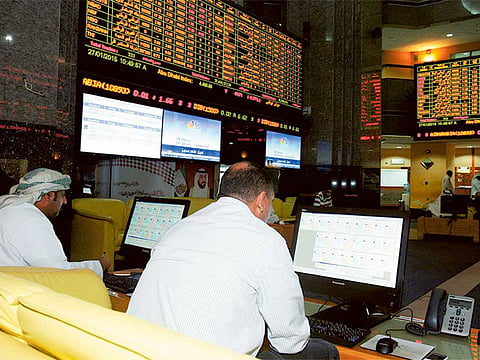UAE, GCC stocks resume drop as virus threats rise
Global markets volatile despite assurances from central banks

Dubai: The indices on Dubai and Abu Dhabi bourses resumed decline on Wednesday, after stimulus measures failed to calm investors panicked about a wider economic impact from the coronavirus.
Investor sentiment was further hurt after seeing the first signs of the fast-spreading contagion impacting UAE businesses. The UAE’s headline PMI had slipped further in February to 49.1, the second consecutive sub-50 reading, which indicates economic contraction territory.
“All components of the headline index softened last month as businesses started to grapple with the impact of the coronavirus on supply chains and demand,” said Aditya Pugalia, director of financial markets research at Emirates NBD.
New cases in UAE, GCC
A day after markets made a partial recovery from Sunday’s steep declines, Dubai Financial Market (DFM) index dropped 2.24 per cent (56.81 points) to 2,479.4, while Abu Dhabi Securities Exchange (ADX) dropped 2.84 per cent (144 points) to 4,669.66.
Elsewhere in the GCC, Saudi Arabia’s benchmark index (TASI) fell 1.7 per cent, with financials and petrochemical shares leading declines. While Kuwait’s major index slipped 0.8 per cent, Qatar’s benchmark dipped 0.4 per cent.
UAE announced six new cases of the coronavirus (Covid19), bringing the number of those infected to 27 and prompting a month-long school closure in the region. Major concerts and sporting events have also been cancelled or postponed in Gulf Arab states, where more than 2,400 cases of the virus, mostly in Iran have been reported.
When GCC markets have so far mostly mirrored global stock moves, regional trading on Wednesday showed a shift in sentiment. Analysts attributed this to the fact that a central bank rate cut by the world’s biggest economy shocked investors by coming in earlier and bigger than expected.
“While (an emergency US Fed rate) cut was largely expected by the markets, the fact that it came earlier and bigger than expected sent a shock through risk assets as markets worry that the extent of Covid19 may be worse than anticipated,” Pugalia added.
US focus shifts to election
US stocks had at first tumbled after the Federal Reserve’s 50 basis-point cut of its benchmark rate overnight, as investors worried the Federal Reserve’s emergency cut won’t be enough to combat the economic impact of the coronavirus.
But the mood reversed on Wall Street with US contracts spiking after Democratic US presidential candidate and former Vice President Joe Biden made a surprise comeback in the race for party nomination, making it the latest development to whip up swings in extremely volatile markets.
Meanwhile in Asia, stocks fell at first but rebounded amid assurances from central banks that liquidity will be provided to counter the impact from the coronavirus outbreak.
Bank Indonesia said it is ready to intervene in currency and bond markets after the Fed’s emergency rate cut. India’s central bank governor said he’s ready to act to shield the economy from the coronavirus and reiterated there’s room to cut interest rates if needed. However, India’s Sensex plunged 700 points in early trading after 25 people have so far been tested positive for the virus in the country.






